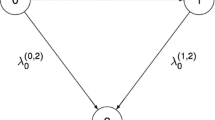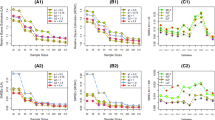Summary
In this paper, we present a Bayesian analysis of mixture models for survival data in the presence of one covariate, and type II censoring data. Considering Gibbs with Metropolis-Hastings algorithms, we get Monte Carlo estimates for the posterior quantities of interest, assuming different choices for the densities in the mixture model. We introduce a numerical example, to illustrate the proposed methodology.





Similar content being viewed by others
References
Albert, J.H.; Chib, S. (1993). Bayesian analysis of binary and polychotomons response data, Journal of the American Statistical Association, 888, 422, 699–679.
Cox, D.R.; Oakes, D. (1984). Analysis of survival data. London: Chapman and Hall.
Dempster, A.; Laird, N.; Rubin, D. (1977). Maximum likelihood from incomplete data via the EM algorithm. Journal of the Royal Statistical Society, series B, 39, 1–38.
Diebolt, J.; Robert, C. (1994). Estimation of finite mixture distributions through Bayesian sampling. Journal of the Royal Statistical Society, Series B, 56, 363–375.
Farewell, V.T. (1982). The use of mixture models for the analysis of survival data with long-term survivors. Biometrics, 38, 1041–1046.
Gelfand, A.E.; Smith, A.F.M. (1990). Sampling based approaches to calculating marginal densities. Journal of the American Statistical Association, 85, 398–409.
Gelman, A.; Rubin, D.B. (1992). Inference from iterative simulation using multiple sequences (with discussion). Statistical Science, 7, 457–511.
Kuo, L.; Peng, F. (1995). A mixture-model approach to the analysis of survival data. Technical Report Number 95–31, dep. of Statistics, University of Connecticut, Storrs, U.S.A.
Robert, CP. (1996). Mixture of distributions: inference and estimation, in Markov Chain Monte Carlo in practice, (eds Gilks, W.R., et al), Chapman and Hall, 441–464.
Smith, A.F.M.; Roberts, G.O. (1993). Bayesian computation via the Gibbs sampler and related Markov Chain Monte Carlo methods, Journal of the Royal Statistical Society, B, 55, 3–24.
Tanner, M.A.; Wong, W.H. (1987). The calculation of posterior distributions by data augmentation (with discussion), Journal of the American Statistical Association, 82, 528–550.
Titterington, D.M.; Smith, A.F.M.; and Makov, U.E. (1985). Statistical Analysis of Finite Mixture Distributions. New York: John Wiley.
Acknowledgements
The authors are thankful to the referees for some useful suggestions.
Author information
Authors and Affiliations
Rights and permissions
About this article
Cite this article
Achcar, J.A., de Araújo Pereira, G. Mixture models for type II censored survival data in the presence of covariates. Computational Statistics 14, 233–250 (1999). https://doi.org/10.1007/s001800050015
Published:
Issue Date:
DOI: https://doi.org/10.1007/s001800050015




